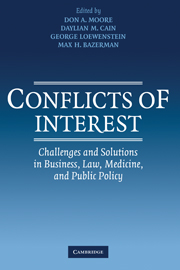Book contents
- Frontmatter
- Contents
- List of Contributors
- Acknowledgments
- Introduction
- PART ONE BUSINESS
- PART TWO MEDICINE
- PART THREE LAW
- PART FOUR PUBLIC POLICY
- 17 Conflicts of Interest in Public Policy Research
- 18 Commentary: Conflicts of Interest in Policy Analysis: Compliant Pawns in Their Game?
- 19 Conflict of Interest as an Objection to Consequentialist Moral Reasoning
- 20 Commentary: Conflict of Interest as a Threat to Consequentialist Reasoning
- Index
- References
18 - Commentary: Conflicts of Interest in Policy Analysis: Compliant Pawns in Their Game?
Published online by Cambridge University Press: 04 August 2010
- Frontmatter
- Contents
- List of Contributors
- Acknowledgments
- Introduction
- PART ONE BUSINESS
- PART TWO MEDICINE
- PART THREE LAW
- PART FOUR PUBLIC POLICY
- 17 Conflicts of Interest in Public Policy Research
- 18 Commentary: Conflicts of Interest in Policy Analysis: Compliant Pawns in Their Game?
- 19 Conflict of Interest as an Objection to Consequentialist Moral Reasoning
- 20 Commentary: Conflict of Interest as a Threat to Consequentialist Reasoning
- Index
- References
Summary
BEHAVIORAL RESEARCH SHOWS NEED FOR POLICY RESEARCH AND ITS LIMITS
MacCoun (2004) insightfully uses a Bayesian framework to characterize debates regarding the relative validity of competing policies and the theories underlying them. That framework allows a thoughtful sorting and integration of empirical, analytical, and philosophical evidence. It reveals cognitive and motivational barriers to fulfilling the Bayesian vision of explicit, coherent hypothesis evaluation. It provides a forensic guide to more and less deliberately malevolent attempts to distort debates in non-Bayesian ways. In a sense, MacCoun does for contentious situations what Ruth Beyth-Marom and I tried to do for individual deliberations (Fischhoff & Beyth-Marom, 1983).
MacCoun raises one potential limit to this framework, posed by the observation of persistently non-Bayesian behavior. These biases have long been used to demonstrate the frailties of human judgment and, with them, the need for compensatory policies. For example, if people cannot understand risks, then, arguably, they need strong regulatory protections, in order to keep dangerous products off the market. Arguably, they also need manipulative public health measures in order to protect them from themselves (e.g., high cigarette taxes, social marketing of abstinence or condom use).
However, MacCoun notes that persistent violations also might suggest a fundamental flaw in the normative model. An extreme position is that people cannot think in the prescribed way, making it an inappropriate aspiration. As a result, it is investigators' responsibility to discern the method in any persistent apparent madness.
- Type
- Chapter
- Information
- Conflicts of InterestChallenges and Solutions in Business, Law, Medicine, and Public Policy, pp. 263 - 269Publisher: Cambridge University PressPrint publication year: 2005

